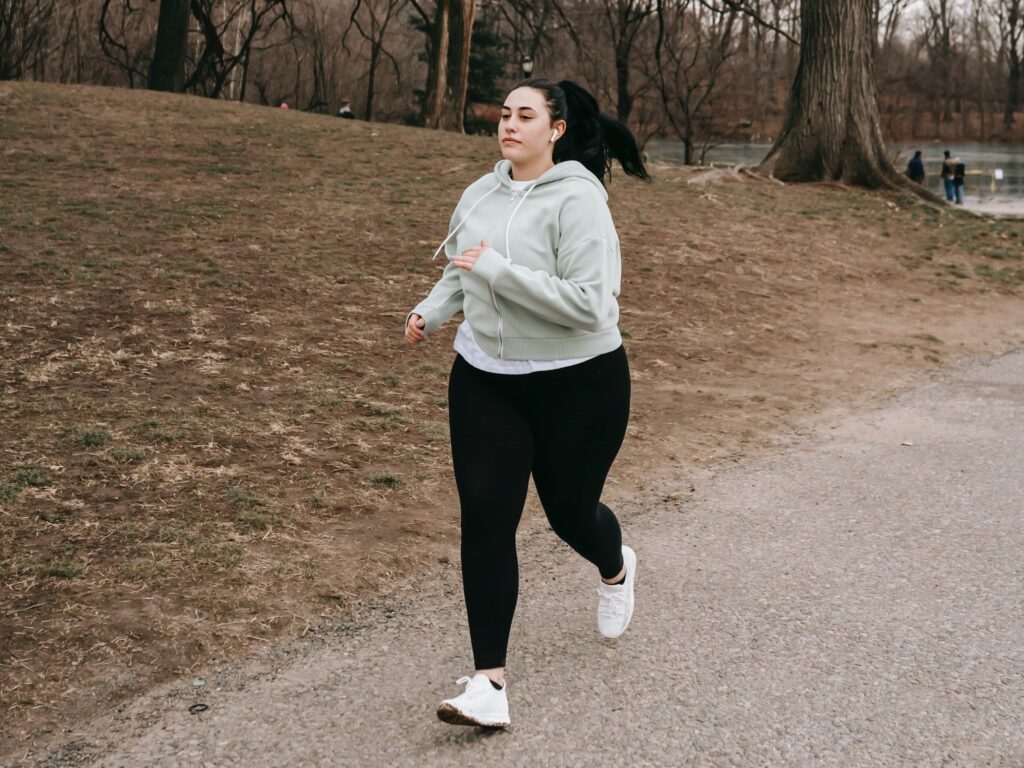This can make a person feel like they’ve caused this condition and that they can’t do much to help themselves. However, that’s not true. By following the right lifestyle, PCOS can not only be managed but the symptoms can also be reversed to a great extent as well.

Highlights
- Exercise is a great way to reduce stress, and it triggers the production of ‘feel-good’ neurotransmitters called endorphins.
- Exercise can help in combating insulin resistance, blood pressure, obesity, cardiovascular diseases and more.
- Research review has found that exercise can be beneficial in helping women with PCOS lose weight, and abdominal fat and lower insulin levels.
What is the role of exercise in managing PCOS?
It’s safe to say that the pandemic has wreaked havoc on most of our lives. Almost everything has shifted to the virtual world, from work meetings to college lectures. As a result, our body doesn’t get enough movement, even while our intake remains the same. Hence, we don’t end up burning enough of the calories that we consume.
And so we turn to exercise. Exercise is a great way to reduce stress; it triggers the production of ‘feel-good’ neurotransmitters called endorphins. It promotes weight management, allows hormones to flow steadily throughout the body, boosts your energy, and keeps illnesses at bay. Exercise can help you improve your overall mood and self-esteem. It helps in combating insulin resistance, blood pressure, obesity, cardiovascular diseases and more.
There are multiple studies and theories that explore the root cause of PCOS. One of them cites insulin resistance as a commonly seen feature in this condition. According to a study, around 65-70% of women with PCOS are insulin resistant. Insulin is a hormone that allows the glucose in the bloodstream to enter the cells, thus, providing them with energy to function. However, if a person’s body is insulin resistant, their cells aren’t ‘sensitive’ to insulin and thus have an impaired response to it.
As a result, the glucose builds up in the bloodstream, and the pancreas has to produce more insulin to make the glucose enter the cells. Eventually, the pancreas is unable to keep up with the cell’s resistance. High blood glucose levels can lead to pre-diabetes and type 2 diabetes if left untreated or unmanaged. In women with PCOS, high insulin levels cause the ovaries to overproduce androgens.
Physical activity can have a favourable effect and help increase insulin sensitivity, allowing your body to use glucose efficiently. A study has found that a single exercise session can increase insulin sensitivity in normal as well as Type 2 diabetic subjects for at least 16 hours post-exercise.

What do the latest PCOS guidelines say?
A research review has found that exercise can be beneficial in helping women with PCOS lose weight and abdominal fat and also lower insulin levels. Furthermore, exercise can help women lose or maintain weight.
According to a systematic review article published in Frontiers in Physiology, which meta-analyzed 19 articles, it was found that exercise of vigorous-intensity can have a significant impact on insulin resistance, body composition, and even cardiorespiratory health of women.
Prevention of weight gain and maintenance
According to the International PCOS Guidelines 2018, adults that fall in the age group of 18-64 years are recommended to have physical activity of moderate intensity for a minimum of 150 minutes per week or physical activity of vigorous intensities for 75 minutes per week or an equivalent combination of both, including muscle-strengthening activities on two non-consecutive days per week. In adolescents, at least 60 minutes of moderate to vigorous-intensity physical activity per day is advised, including those that strengthen muscle and bone at least thrice weekly.
Modest weight loss or prevention of weight re-gain
The International PCOS Guidelines 2018 suggest that there should be either a minimum of 250 minutes each week of moderate-intensity activities or 150 minutes each week of vigorous-intensity activities or an equivalent combination of both and muscle-strengthening activities involving major muscle groups on two non-consecutive days per week. There should also be minimized sedentary, screen, or sitting time which is allotted.
Ideal daily steps
As per the guidelines, 10,000 daily steps are ideal, including about 30 minutes or 3,000 steps of structured physical activity, and the rest are as per daily activities. Physical activities may include leisure-time physical activities, transportation such as walking or cycling, occupational work, household chores, games, sports, or planned exercise in the context of daily, family, and community activities.

What is the best way to approach exercise with PCOS?
Daily movement of some sort is crucial to managing PCOS. Now, things may be a bit different for women with PCOS as they tend to get too tired/fatigued to work out, and this turns into a vicious cycle.
Starting slow
Most people make the mistake of jumping straight in and trying out all sorts of exercises. It’s better to start slow and get the hang of working out first, for instance, by walking a few minutes each day and gradually increasing the limit. Start with a slow 10-minute slow walk. Increase this duration gradually every day and try to be consistent.
As ‘The Habit Coach’ says: never miss two days in a row. Slow workouts are typically more suitable for women with PCOS. It is really important to discuss this with instructors. A reason behind not losing weight could be that one may be unknowingly putting their body under a lot of stress in an attempt to lose weight!
Once they are ready, they should include strength training or vigorous training at least thrice a week to build lean muscle. This helps tremendously in reducing insulin resistance. Strength training can be done in numerous forms: yoga, pilates, or even lifting weights.
Be consistent
An easy way for people to start their journey is to carry out their favourite activity. It could be indoor workouts, outdoor walks, yoga or gymming, dancing, or pilates. It should be an activity they enjoy every day and one they look forward to. Most importantly, they should follow achievable goals and give themselves time to recover from such activities. Getting a good night’s sleep is also super helpful for proper recovery after workouts.
Make the right choices
Remember, those food choices can make a massive difference to one’s health. Consuming hormone-friendly, nutritious foods and finding alternatives to favourite junk-food items is a must. For instance, one can replace their everyday toast and jam with whole-grain bread, peanut butter, and homemade strawberry jam, or replace their favourite sweets with naturally sweetened chocolate. (The choices are endless!).
For lean PCOS, one should increase clean or good calories and eat more protein-rich foods and complex carbs. It’s important to understand that weight issues are a byproduct of hormonal imbalances and not the cause of PCOS. Acknowledging that PCOS is not something that someone can inflict upon themselves is a big step towards body positivity.
Know the body’s limitations and fitness levels. It takes time to get into the habit of working out, especially for those accustomed to a sedentary lifestyle. It’s important not to immediately jump onto the bandwagon of trends such as HIIT or any intense workout just because a gym instructor may have said so. Working with friends or in a community or group can help in bringing about motivation and reduces the inclination to miss workouts.
Blood sugar management
To know the impact of certain food choices on blood glucose levels, one can make use of a continuous glucose monitoring (CGM) device. This approach would help them avoid spikes and have better energy levels throughout the day. Along with this, one can ask themselves the following questions to stay healthy
- Is their body being nourished enough?
- Are they managing their stress well, and how??
- Is their body deficient in crucial vitamins? (This can be determined through lab tests and expert consultations)
- Have they been ignoring persistent gut issues?
Conclusion
Exercise can help individuals with PCOS reduce stress, manage weight and abdominal fat, and lower insulin levels. It can help increase the body’s insulin sensitivity and combat cardiovascular diseases, obesity, blood pressure, etc. Indulging in physical activities such as cycling, games, sports, jogging, or other activities of choice can be a great way to build the habit of exercising every day. Recommendations also include minimising sedentary, screen, or sitting time. When coupled with blood sugar management and a well-balanced diet, exercise can significantly impact individuals’ overall health and well-being.
Disclaimer: The contents of this article are for general information and educational purposes only. It neither provides any medical advice nor intends to substitute professional medical opinion on the treatment, diagnosis, prevention or alleviation of any disease, disorder or disability. Always consult with your doctor or qualified healthcare professional about your health condition and/or concerns and before undertaking a new healthcare regimen including making any dietary or lifestyle changes.
Reference







